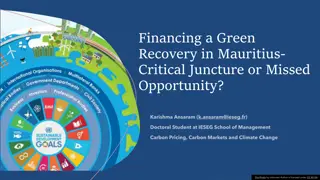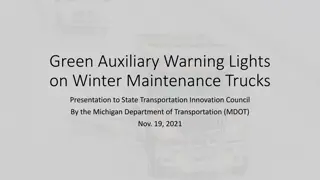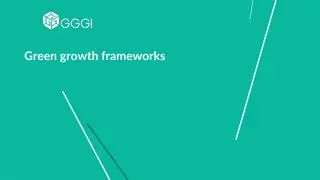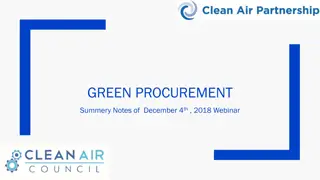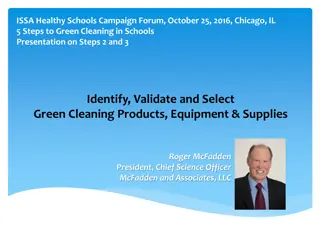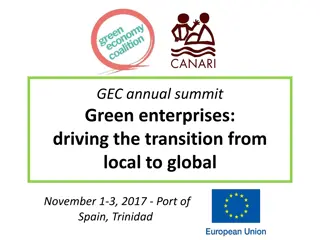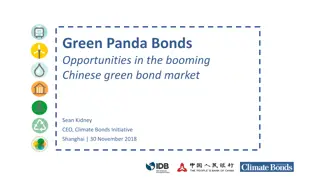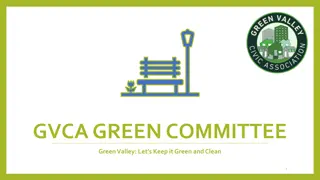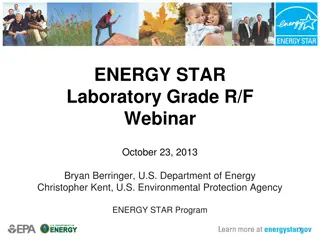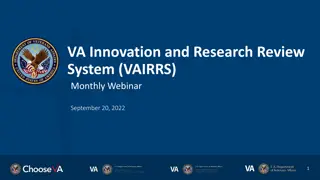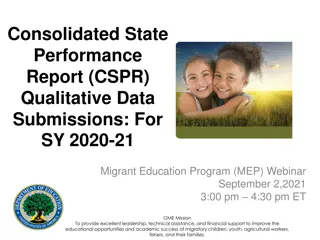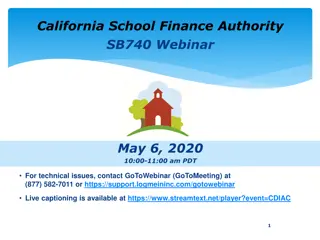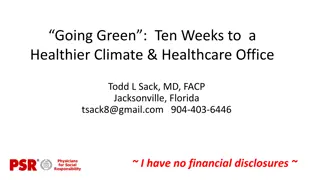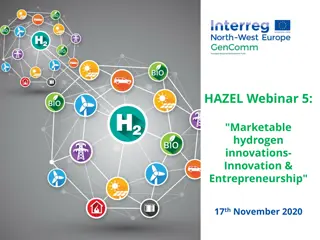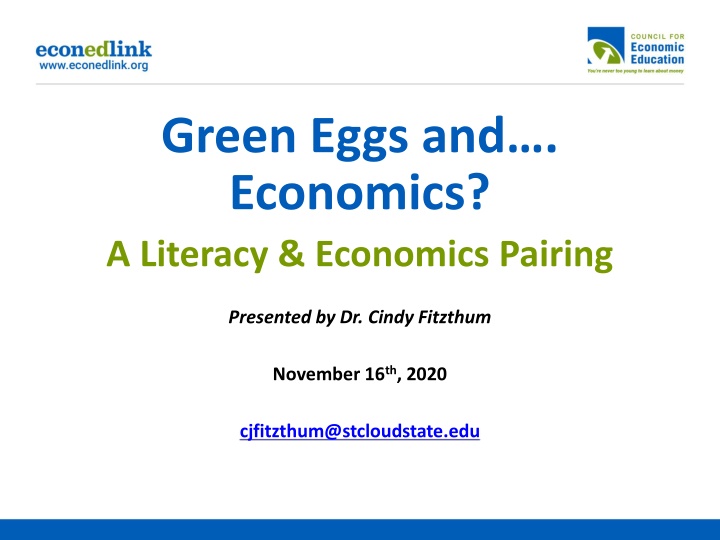
Interpret Key Economic Concepts in Dr. Seuss Books
Explore the correlation between literacy and economics using popular Dr. Seuss books like "Green Eggs and Ham" and "The Lorax." This presentation by Dr. Cindy Fitzthum delves into how economic principles can be interpreted from these beloved children's stories.
Download Presentation

Please find below an Image/Link to download the presentation.
The content on the website is provided AS IS for your information and personal use only. It may not be sold, licensed, or shared on other websites without obtaining consent from the author. If you encounter any issues during the download, it is possible that the publisher has removed the file from their server.
You are allowed to download the files provided on this website for personal or commercial use, subject to the condition that they are used lawfully. All files are the property of their respective owners.
The content on the website is provided AS IS for your information and personal use only. It may not be sold, licensed, or shared on other websites without obtaining consent from the author.
E N D
Presentation Transcript
Green Eggs and. Economics? A Literacy & Economics Pairing Presented by Dr. Cindy Fitzthum November 16th, 2020 cjfitzthum@stcloudstate.edu cjfitzthum@stcloudstate.edu
EconEdLink Membership You can now access CEE s professional development webinars directly on EconEdLink.org! To receive these new professional development benefits, become an EconEdLink member. As a member, you will now be able to: Automatically receive a professional development certificate via e-mail within 24 hours after viewing any webinar for a minimum of 45 minutes Register for upcoming webinars with a simple one-click process Easily download presentations, lesson plan materials and activities for each webinar Search and view all webinars at your convenience Save webinars to your EconEdLink dashboard for easy access to the event You may access our new Professional Development page here
Professional Development Certificate To earn your professional development certificate for this webinar, you must: Watch a minimum of 45-minutes and you will automatically receive a professional development certificate via e-mail within 24 hours. Accessing resources: You can now easily download presentations, lesson plan materials, and activities for each webinar from EconEdLink.org/professional-development/
Agenda Objectives Standards Lesson Overview & Application Ideas Assessment Resources Q and A
Objective Students will be able to interpret and analyze key economic concepts contained in popular Dr. Seuss books.
The Cat In The Hat The Cat In The Hat: : A cat visits Sally and Sam and gives them perspective Green Eggs and Ham Green Eggs and Ham: : Multiple attempts to try this delicacy by Sam-I-Am shows how decisions can evolve The Lorax The Lorax: : Speaks for the trees a.k.a. environmental protection and purposeful action Oh, the Places You ll Go! Oh, the Places You ll Go!: : The journey of life and unexpected but rewarding challenges Horton Hears A Who! Horton Hears A Who!: : Protecting a microscopic community, a.k.a. treating others fairly, no matter how small
Written on Paper or as Word document Pause and reflect: Answer the questions Make connections to your situation Question what you want to research further
National Standards Name: Decision Making Standard: 2 Students will understand that: Effective decision making requires comparing the additional costs of alternatives with the additional benefits. Many choices involve doing a little more or a little less of something: few choices "are all or nothing" decisions. Students will be able to use this knowledge to: Make effective decisions as consumers, producers, savers, investors, and citizens. Name: Incentives Standard: 4 Students will understand that: People usually respond predictably to positive and negative incentives. Students will be able to use this knowledge to: Identify incentives that affect people's behavior and explain how incentives affect their own behavior.
National Standards Name: Role of Government and Market Failure Standard: 16 Students will understand that: There is an economic role for government in a market economy whenever the benefits of a government policy outweigh its costs. Governments often provide for national defense, address environmental concerns, define and protect property rights, and attempt to make markets more competitive. Most government policies also have direct or indirect effects on people's incomes. Students will be able to use this knowledge to: Identify and evaluate the benefits and costs of alternative public policies, and assess who enjoys the benefits and who bears the costs.
How do you integrate literacy into economics now? Share in chat and/or journal.
Reflect Reflect: : How can you do this in person OR virtually with your students?
1. The Cat in the Hat & Green Eggs and Ham 2. The Lorax 3. Oh, the Places You ll Go! 4. Horton Hears a Who! Have students read the book within their groups.
What economic concepts economic concepts did you identify in your book? (note page number) Find a role Find a role for each member (discourage free riders) by asking each student to do 1-2 concepts Then, have the teacher go through the Concept Overview and Concept Powerpoint to check for understanding. understanding. check for
Green Eggs and Economics? Concepts Overview
What economic concepts are present in Dr. Seuss books?
The Cat in the Hat What examples did you see of asymmetric information environmental issues externalities monitoring costs recreation/leisure
Green Eggs and Ham What examples did you see of complements experience goods interpersonal differences in preferences utility
The Lorax What examples did you see of economies of scale endangered species environmental externalities property rights and enforcement specialization and division of labor tragedy of the commons wants
Oh, the Places Youll Go! What examples did you see of personal beliefs in ability and luck choices competition individual interests and abilities information leisure/recreation migration opportunity cost risk uncertainty utility waste/inefficiency
Horton Hears a Who! What examples did you see of asymmetric information public choice collective action/demonstrations shirking specialization discrimination skills endangered species
Use this tool to check for understanding of these definitions after review (on EconEdLink already created! )
Reflect Reflect: What terms might challenge your students? Journal and/or chat now. Have each group outline their findings on a poster board or Powerpoint to present to the class the next day! Encourage creativity!
Title of Book Economic Concept(s) Found Short Definition of Economic Concept In what context it applies to the passage Page number passage appears on. Encourage images, visuals and take 5-10 minutes.
During the presentations, have each student individually provide feedback to each group. One Strength, One Weakness, One Idea Self-reflection of their own group Reflect Reflect: How will this strengthen their understanding of economic concepts?
Locate one economic principle (from Dr. Seuss) and find a news article illustrating the same concept One-page essay (summarize, define, explain) Create an advertisement, song lyrics, poem or movie
Freakonomics (2005) Movie or Book Review Illustrate how economics is all around us, by journaling or other creative medium.
Assessment Questions 1. Please use/attach (from lesson): 1. Concept Powerpoint 2. Concept Worksheet 3. Kahoot! 4. Group Presentation Rubric
References The Cat in the Hat (1957) Green Eggs and Ham (1960) The Lorax (1971) Oh, the Places You ll Go! (1990) Horton Hears A Who! (1954)
CEE Affiliates https://www.councilforeconed.org/resources/local-affiliates/





